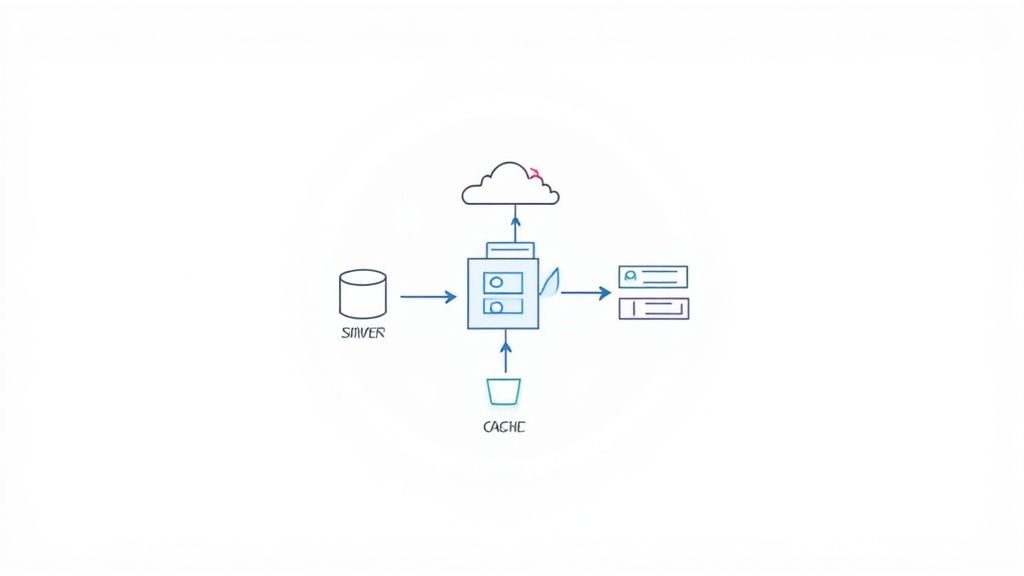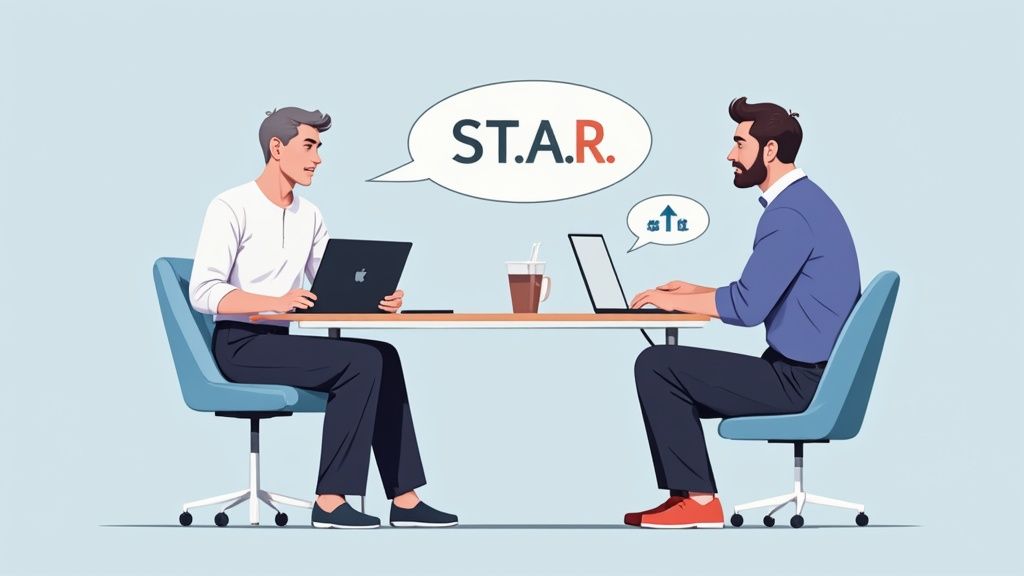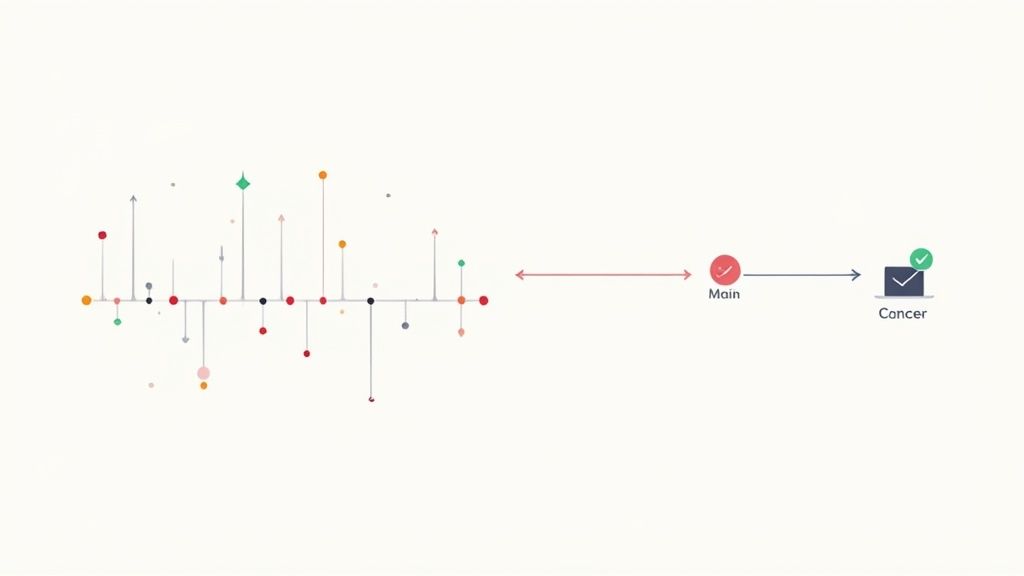
Hiring developers is a high-stakes gamble, and most companies are playing with a stacked deck—against themselves. You spend weeks sifting through résumés, schedule endless calls, and ask questions you found on a blog from 2012. The result? You either hire someone who can reverse a binary tree on a whiteboard but can’t collaborate their way out of a paper bag, or you miss out on a great engineer because they froze on a trick question.
Hope you enjoy spending your afternoons running technical interviews—because that’s now your full-time job.
Turns out, there’s a better way to find elite talent without mortgaging your office ping-pong table. After filtering hundreds of thousands of candidates, we’ve learned what actually works. The problem isn’t finding people who can code; it’s finding people who can think, communicate, and build solutions as part of a team. Forget the brain teasers and "gotcha" algorithms. This guide isn't just another list of generic interview questions for developers; it's a curated collection of diagnostic tools designed to reveal true engineering capability. We’ve broken down the 12 essential question categories that separate the good-on-paper from the great-on-the-job, helping you build a team that actually ships code.
Ah, the classic whiteboarding gauntlet. Popularized by tech giants and now a staple everywhere, these are the algorithmic brain teasers that live in every developer’s nightmares. Think LeetCode-style challenges like “Two Sum” or traversing a binary tree. The goal isn’t just to see if a candidate can code, but how they think under pressure. You’re evaluating their raw problem-solving horsepower, grasp of data structures, and ability to analyze complexity.
The Cold Truth: This is a commodity skill test. It tells you if they can solve a puzzle, not if they can build a product. But it’s a necessary evil to weed out the absolute beginners.
A great candidate won’t just jump into coding. They will:
This approach is table stakes for assessing core technical skills. If you're looking to formalize this process without the headache, you can find more information about implementing pre-employment skills testing.
This is where you graduate from algorithms to architecture. System design questions are the ultimate test of high-level thinking, asking candidates to sketch out the blueprint for massive, scalable services like a URL shortener or a Twitter feed. You’re not just checking if they can code; you’re evaluating if they can think like an architect, balancing trade-offs between performance, cost, and reliability.
These are the interview questions for developers that reveal who can see the entire forest, not just the individual trees. It separates the senior-level thinkers from everyone else.

A strong candidate won’t just list technologies. They will:
This approach is crucial for assessing if a developer can build systems that don’t just work, but also scale gracefully.
Beyond pure coding chops, you need to know if a developer can actually function on a team without causing a five-alarm fire. Enter behavioral questions, the HR-approved method for digging into a candidate’s past performance. These aren’t hypotheticals; they’re targeted probes like, "Tell me about a time you disagreed with a manager’s feedback." The goal is to see how they navigate the messy, human side of software development.

Let's be direct: This is your defense against hiring a brilliant jerk. You're looking for evidence of self-awareness, collaboration, and a growth mindset—qualities that separate a good coder from a great teammate.
A strong candidate won't give vague, generalized answers. They will:
These questions are crucial for building a resilient and collaborative engineering culture. For more insights, you can explore the critical role of soft skills in remote hiring.
Beyond raw algorithms, these questions test a developer’s architectural mindset. This is where you separate the code monkeys from the software engineers by probing their understanding of inheritance, polymorphism, encapsulation, and abstraction. You’re not just asking for definitions; you’re looking for their ability to design scalable, maintainable systems.
If your candidate can’t explain SOLID principles, you might be looking at a future full of spaghetti code and technical debt. These are foundational interview questions for developers for a reason.
A strong candidate moves beyond textbook definitions and into practical application. They will:
Data is the lifeblood of any application, and knowing how to manage it is non-negotiable. These questions cut through the fluff to see if a developer can do more than just SELECT *. You're testing their understanding of database design, query performance, and the trade-offs between normalization and speed. It’s about assessing their ability to model data effectively and write queries that won’t grind your application to a halt.
The $500 Hello: The cost of one bad query in production. This is where you find out who actually understands how data flows.
A strong candidate moves beyond basic syntax and demonstrates a deeper understanding. They will:
This approach is crucial for hiring developers who can build scalable and efficient systems, making it a key part of your interview questions for developers toolkit.
This is where the rubber meets the road for any application that needs to talk to another. Questions about APIs, HTTP, and web security aren’t just academic; they reveal if a developer understands how modern software is actually built and connected. You’re testing their grasp of the fundamental language of the internet, from RESTful design principles to the nuances of CORS.
Forget building a monolith; if your candidate can’t design a clean API for a simple blog platform, they’re not ready for a distributed world.
A strong developer doesn’t just spit out HTTP status codes. They will:
These interview questions for developers are crucial for gauging if a candidate can build systems that communicate reliably and securely.
Shipping code without tests is like building a skyscraper without a foundation—a disaster waiting to happen. This category of interview questions for developers probes a candidate's commitment to quality. You’re looking for someone who sees testing not as a chore, but as an integral part of the development lifecycle. This is where you learn if they build robust, maintainable software or just code that works "on my machine."
Forget shipping and praying. This is how you find engineers who build with confidence and sleep soundly at night.
A top-tier candidate doesn't just write tests; they have a testing philosophy. They will:
This approach reveals an engineer's discipline and long-term thinking. To dive deeper into this area, you can learn more about implementing quality assurance testing methods.
You can’t build software with a team without a solid grasp of Git. These questions go beyond git commit and git push to probe a candidate’s understanding of collaborative workflows, branching strategies, and how to fix things when they inevitably go wrong. This is where you find out if they’ll merge spaghetti code into the main branch on a Friday afternoon.
It's not just about knowing commands; it's about understanding the philosophy behind modern, collaborative development. Hope you enjoy untangling merge conflicts, because these questions reveal who can navigate the daily realities of team-based coding.

A strong candidate demonstrates both technical knowledge and practical wisdom. They will:
rebase vs. merge: They understand the trade-offs, explaining how rebase maintains a cleaner history while merge preserves the original context.These questions are crucial for assessing a candidate's ability to work effectively on a team.
This is where the rubber meets the road. Any developer can write code that works, but can they write code that performs? These questions dig into a candidate's ability to hunt down bottlenecks, squash elusive bugs, and make systems run faster and more reliably. You're not just asking about theory; you're probing their real-world experience with production fires.
Forget perfect algorithms for a moment. This is about asking a candidate how they’d debug a memory leak at 2 a.m. with the entire system on the line.
A top-tier candidate demonstrates a systematic, evidence-based approach. They will:
These interview questions for developers reveal who can keep a complex system healthy and efficient under pressure.
Writing code is one thing; getting it to run reliably for millions of users is another beast entirely. This is where you separate the coders from the engineers. These questions test a candidate's understanding of the entire application lifecycle, from commit to production. You’re evaluating their grasp of CI/CD, containerization (hello, Docker), and cloud infrastructure.
If a developer doesn’t know how their code gets deployed, they’re only seeing half the picture. This category of interview questions for developers ensures you hire someone who thinks about scalability, reliability, and automation from day one.
A top-tier candidate demonstrates a holistic view of software delivery. They will:
Beyond abstract algorithms, your candidate needs to actually build things with your tech stack. This is where you test their practical, day-to-day knowledge of the specific tools they'll be using. Questions about React hooks, Python decorators, or the intricacies of Spring Boot dependency injection reveal if they’ve truly lived in the ecosystem or just skimmed the documentation.
You’re looking for someone who understands not just the "what" but the "why" behind the framework's design choices. Hope you enjoy debating the merits of server components, because this is how you find a real craftsperson.
A top-tier candidate demonstrates deep, hands-on expertise. They will:
This questioning is vital for ensuring a new hire can hit the ground running. To dive deeper into vetting for specific skill sets, explore how to effectively evaluate a developer’s skills.
This is where theory dies. These questions move beyond pure code to test a developer’s judgment and pragmatism. You present them with a tricky, real-world work scenario: a critical bug is found post-deployment, a project is falling behind schedule, or they fundamentally disagree with a technical decision. The goal is to see how they navigate ambiguity, pressure, and team dynamics.
Welcome to the land of "it depends," where the how and why behind an answer are more important than the answer itself.
A strong candidate won’t offer a single, perfect solution. Instead, they will:
| Assessment Type | Implementation complexity | Resource requirements | Expected outcomes | Ideal use cases | Key advantages |
|---|---|---|---|---|---|
| Technical / Coding Problem-Solving Questions | Medium — timed coding and setup | Low–Medium — coding environment or whiteboard | Measures algorithmic skill and code quality | Screening for algorithmic proficiency, junior–mid roles | Standardizable, reveals problem-solving process |
| System Design and Architecture Questions | High — open-ended, diagram-heavy | Medium–High — senior interviewer time, diagrams | Assesses scalability, reliability, trade-offs | Senior, lead, and architecture-focused roles | Evaluates system-level thinking and trade-off analysis |
| Behavioral and Soft Skills Questions | Low — conversational format | Low — interviewer time only | Identifies communication, teamwork, cultural fit | All roles to assess collaboration and fit | Predicts team integration and interpersonal skills |
| Object-Oriented Programming (OOP) Concepts Questions | Low–Medium — conceptual + design tasks | Low — discussion or small design exercises | Tests design principles, SOLID, patterns | Roles emphasizing maintainable, OO codebases | Predicts code quality and design discipline |
| Database and SQL Questions | Medium — query writing and modeling | Low–Medium — DB access or sample data | Measures data modeling and query optimization | Backend, data-heavy applications, reporting roles | Practical impact on performance and correctness |
| Web Technologies and API Questions | Medium — protocol and security focus | Low–Medium — examples or small design tasks | Assesses API design, security, integration knowledge | Web, full‑stack, and API-focused roles | Directly applicable to web app development |
| Testing and Quality Assurance Questions | Medium — practical and methodological | Medium — test frameworks/examples | Evaluates testing strategy and TDD skills | Roles prioritizing reliability and maintainability | Ensures long-term code quality and safer refactoring |
| Version Control and Git Questions | Low — workflow and command-based | Low — Git repos or scenarios | Tests branching, merge, and collaboration practices | All development teams | Fundamental for team collaboration and history |
| Performance Optimization and Debugging Questions | Medium–High — profiling and analysis | Medium — profiling tools, realistic data | Identifies bottleneck solving and optimization skills | High-performance, resource-constrained systems | Improves UX, reduces costs, enhances scalability |
| DevOps, Deployment, and Infrastructure Questions | High — infra and pipeline focused | High — CI/CD tools, cloud access | Assesses deployment automation and reliability | DevOps, SRE, platform and ops roles | Enables faster, more reliable delivery and scaling |
| Language-Specific and Framework Questions | Low–Medium — tool/idiom focused | Low — code samples or live demos | Verifies practical stack-specific proficiency | Immediate-productivity hires for specific stacks | Directly applicable, easier to validate hands-on skills |
| Situational and Scenario-Based Questions | Medium — case-driven, contextual | Low–Medium — interviewer scenarios | Evaluates judgment, trade-offs, risk mitigation | Senior engineers, PM interactions, complex decisions | More realistic assessment of on-the-job decision-making |
We've just walked through a comprehensive gauntlet of interview questions for developers, spanning everything from deep-dive coding challenges and architectural blueprints to the behavioral nuances that separate a good coder from a great teammate. You now have a battle-tested arsenal of questions covering system design, databases, DevOps, and more. The goal was never to hand you a script to read from; it was to give you a framework for thinking about what truly matters when you hire.
The big takeaway? A killer interview process isn't about finding a mythical unicorn who aces every single category. It’s about building a balanced scorecard that gives you a holistic view of a candidate’s capabilities. You need to identify where their genius lies. Are they the architect who can see the entire system from 30,000 feet? The coding wizard who can optimize an algorithm until it sings? Or the collaborative linchpin who makes the entire team better? The real trick is knowing which of these skills are your non-negotiables for the specific role you’re filling right now.
So, what's next? Don't just file this list away. It's time to put it into action.
Mastering this process is valuable. It leads to better hires, stronger teams, and less technical debt. But let's be pragmatic. Building and running this kind of rigorous, multi-faceted interview loop is a massive time sink.
Hope you enjoy spending your afternoons fact-checking resumes and running technical interviews—because that’s now your full-time job.
Or, you could skip all that. At LatHire, we’ve already built the engine you need. We use a sophisticated blend of AI-driven assessments and expert human-led vetting that covers all these bases before a candidate’s profile ever reaches your inbox. We dig into their coding proficiency, their architectural thinking, and their ability to collaborate, so you don't have to. Toot, toot!
We’re not saying we’re perfect. Just more accurate more often. If you'd rather spend your energy building your product than building an interview process from scratch, maybe we should talk.